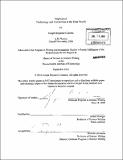Implanted : technology and connection in the deaf world
Author(s)
Calamia, Joseph Benjamin
DownloadFull printable version (1.993Mb)
Alternative title
Technology and connection in the deaf world
Other Contributors
Massachusetts Institute of Technology. Graduate Program in Science Writing.
Advisor
Robert Kanigel.
Terms of use
Metadata
Show full item recordAbstract
In 1984, the FDA approved a medical device called a cochlear implant for adult use in the United States. Unlike assistive hearing technologies that came before it, such as hearing aids, cochlear implants could offer wider access to sound even to the profoundly deaf. Given adult success with the device, the FDA lowered in 1990 the required age for implantation to two years old. The following year the National Association of the Deaf published a position statement on cochlear implants comparing them to "cultural genocide." This thesis explores two parallel stories. Drawing on interviews with implant engineers, surgeons, audiologists, and other specialists, the piece describes how cochlear implants function and how the devices have improved since the 1980s. Equally, the thesis pulls from interviews with bioethicists, deaf and hard of hearing individuals, educators at a signing deaf school, and others in the deaf community to describe the unique attributes and history of deaf culture and the changing and diverse reactions of the deaf community to this medical device.
Description
Thesis (S.M. in Science Writing)--Massachusetts Institute of Technology, Dept. of Humanities, Graduate Program in Science Writing, 2010. Cataloged from PDF version of thesis. Includes bibliographical references (p. 27-30).
Date issued
2010Department
Massachusetts Institute of Technology. Graduate Program in Science Writing; MIT Program in Writing & Humanistic StudiesPublisher
Massachusetts Institute of Technology
Keywords
Graduate Program in Science Writing.